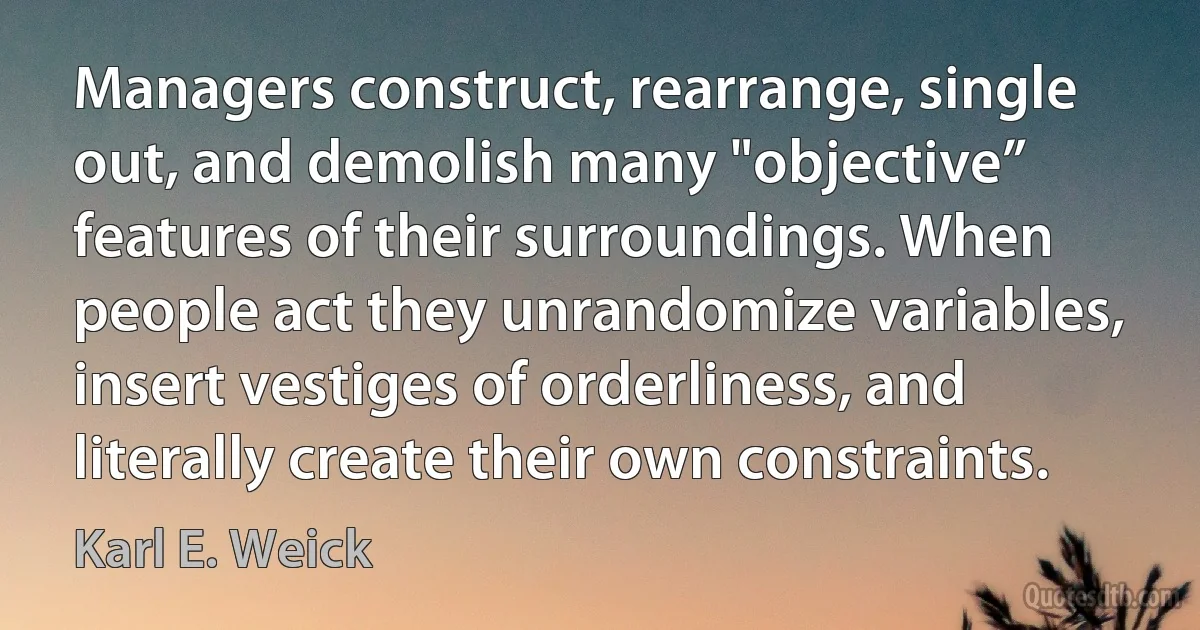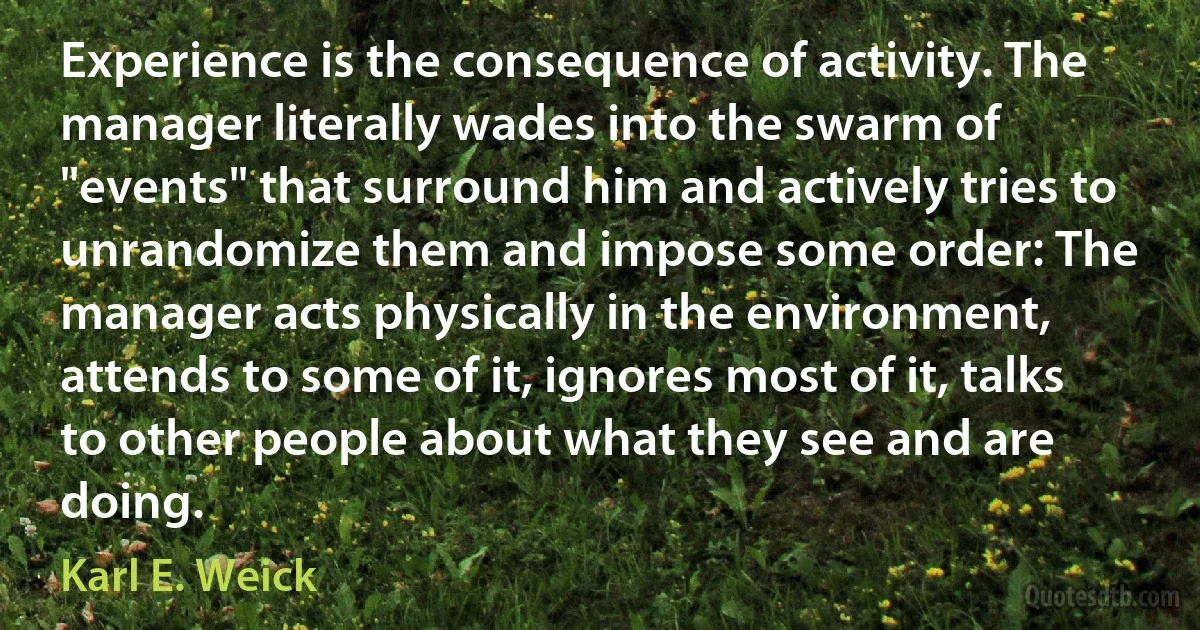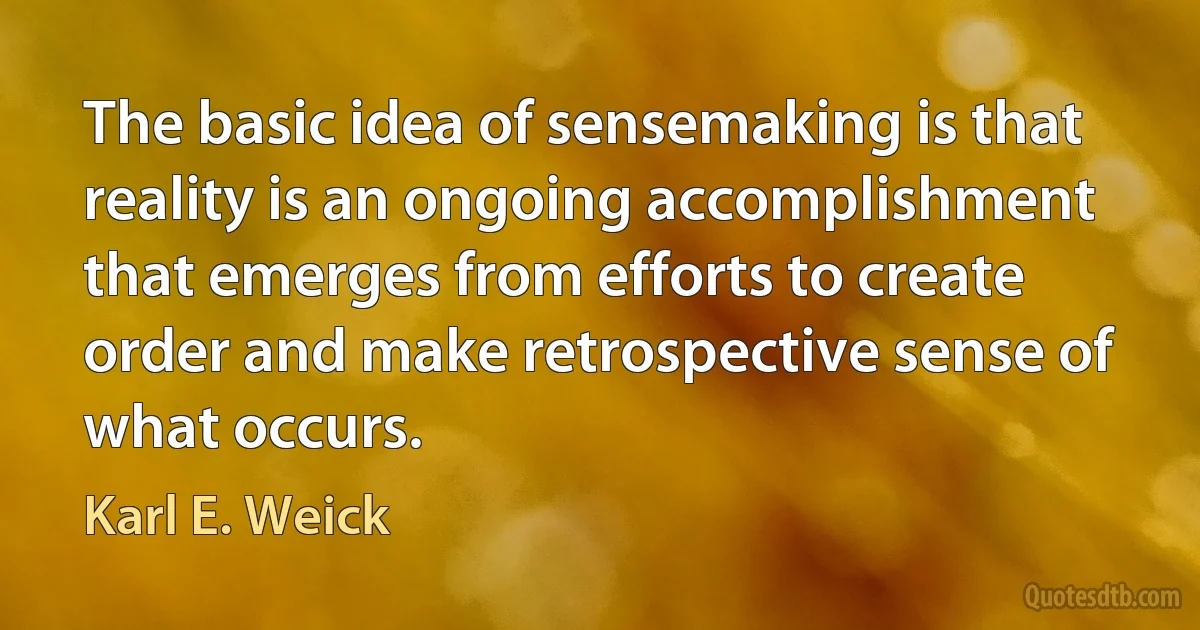Karl E. Weick quotes
They [laboratory groups] bypass such questions as how one comes to know that a problem exists, what it does to solution adequacy to be working on several different things concurrently with problem solving, what it's like to go about solving a felt, intuited problem rather than an explicitly stated consensually validated problem which was made visible to all members at a specific point in time.

Karl E. Weick
In a loosely coupled system there is more room available for self-determination by the actors. If it is argued that a sense of efficacy is crucial for human beings. ihen a sense of efficacy might be greater in a loosely coupled system with autonomous units than it would be in a tightly coupled system where discretion is limited.

Karl E. Weick
Roethlisberger argues that people who are preoccupied with success ask the wrong question. They ask, "what is the secret of success” when they should be asking, "what prevents me from learning here and now?” To be overly preoccupied with the future is to be inattentive toward the present where learning and growth take place. To walk around asking, "am I a success or a failure” is a silly question in the sense that the closest you can come to answer is to say, everyone is both a success and a failure.

Karl E. Weick
By loose coupling, the author intends to convey the image that coupled events are responsive, but that each event also preserves its own identity and some evidence of its physical or logical separateness. Thus, in the case of an educational organization, it may be the case that the counselor's office is loosely coupled to the principal's office. The image is that the principal and the counselor are somehow attached, but that each retains some identity and separateness and that their attachment may be circumscribed, infrequent, weak in its mutual affects, unimportant, and/or slow to respond.

Karl E. Weick
When people perform an organized action sequence and are interrupted, they try to make sense of it. The longer they search, the higher the arousal, and the stronger the emotion. If the interruption slows the accomplishment of an organized sequence, people are likely to experience anger. If the interruption has accelerated accomplishment, then they are likely to experience pleasure. If people find that the interruption can be circumvented, they experience relief. If they find that the interruption has thwarted a higher level plan, then anger is likely to turn into rage, and if they find that the interruption has thwarted a minor behavioural sequence, they are likely to feel irritated.

Karl E. Weick
There is no methodological process by which one can confirm the existence of an object independent of the confirmatory process involving oneself. The outside is a void, there is only the inside. A person's world, the inside or internal view is all that can be known. The rest can only be the object of speculation.

Karl E. Weick
Sensemaking is about the enlargement of small cues. It is a search for contexts within which small details fit together and make sense. It is people interacting to flesh out hunches. It is a continuous alternation between particulars and explanations with each cycle giving added form and substance to the other.

Karl E. Weick
The process of theory construction in organizational studies is portrayed as imagination disciplined by evolutionary processes analogous to artificial selection. The quality of theory produced is predicted to vary as a function of the accuracy and detail present in the problem statement that triggers theory building, the number of and independence among the conjectures that attempt to solve the problem, and the number and diversity of selection criteria used to test the conjectures.

Karl E. Weick
Action often creates the orderly relations that originally were mere presumptions summarized in a cause map. Thus language trappings of organizations such as strategic plans are important components in the process of creating order. They hold events together long enough and tightly enough in people's heads so that they act in the belief that their actions will be influential and make sense.

Karl E. Weick
The point we want to make here is that sensemaking is about plausibility, coherence, and reasonableness. Sensemaking is about accounts that are socially acceptable and credible... It would be nice if these accounts were also accurate. But in an equivocal, postmodern world, infused with the politics of interpretation and conflicting interests and inhabited by people with multiple shifting identities, an obsession with accuracy seems fruitless, and not of much practical help, either.

Karl E. Weick



